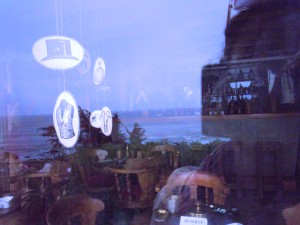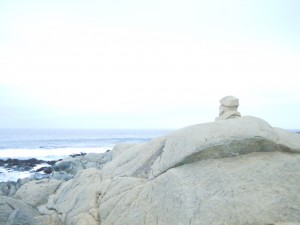Excerpt from “Ode to My Socks”
Violent socks,
my feet were two fish made of wool,
two long sharks
sea blue, shot through
by one golden thread,
two immense blackbirds,
two cannons,
my feet were honored in this way
by these heavenly socks.
A murky death
“Suspicions rise in Pablo Neruda’s death,” proclaimed the headline of a recent article by the Associated Press. My first suspicions of foul play arose earlier this year during a guided tour of Neruda’s house in Santiago, Chile — one of three houses-turned-museums kept by the estate of the iconic Chilean poet and diplomat.
A guide informed my tour group that Neruda had “died of a broken heart.” Slipped in among a barrage of eccentric tidbits about Neruda that were underscored by the presentation of the most thorough nautical motif ever executed on dry land (his home), this winking explanation went unnoticed by most. Even as a metaphor, Neruda’s “broken heart” struck me as a bit too footloose and fancy-free. Especially in a country where such euphemisms have been substituted for real investigations of the unresolved deaths of thousands who were persecuted by the government of Augusto Pinochet during his 17-year dictatorship that ended in 1990.
In spite of his whimsical side, Neruda was a well-known dissident and a one-time senator of Chile’s Communist Party, and had been exiled when Communism was previously outlawed in Chile in 1948. I had learned this half-an-hour earlier from engravings on a wall of the museum’s café, yet there appeared to be few other skeptics in the crowd. Still, the guide indulged my inquiries and elaborated a bit.
You see, Neruda’s “broken heart” was one of many casualties of the military coup that ousted the Socialist government of Chile in 1973 and promptly resulted in what the AP clinically refers to as the “lethal persecutions” of several of Neruda’s close friends and fellow socialists. Neruda’s despair at the violent loss of compañeros, like then-President Salvador Allende, allegedly proved fatal when, less than 2 weeks after the coup, his physiological reaction sent him to the Clinica Santa Maria, the most prominent hospital in Santiago.
Uncontested is the fact that at the hospital he was injected with Dipirona, a sedative that ultimately killed him, according to AP.
I don’t presume to know whether Neruda was killed directly by the military coup or if he just died of a flare up of the cancer he was fighting (though medical records show his disease had been well under control and his health improving at the time of his death). Or perhaps poets can die of clichéd poetic devices. A recent autopsy of Allende, whose death had also been under scrutiny for decades, revealed that the ‘official version’ — that he committed suicide during the impending coup — was accurate.
While the current project underway in Chilean courts to investigate hundreds of deaths that occurred during Pinochet’s rule is important for the nation, the specifics of how Neruda died won’t change the reality of the dictatorship.
Lessons from Neruda’s life(style) 
Having now visited all three of Neruda’s houses in Chile, what I can say is that the guy lived well. I’m not talking jacuzzi-and-private-jet well; I’m talking adult-sized-see-saws-and pretending-to-live-on-a-ship well (without the delusional Neverland Ranch vibes). I mean he had a good time.
Lately, I’ve been (literally) taking notes whenever I encounter someone who has (or had) an occupation/lifestyle combo that I find to be particularly awesome. I’m at a point in my life when, regardless of the economy, I need to figure out what I want to do and then figure out exactly how to go about doing it. Unfortunately, I am still scratching my head as to how Neruda managed to be such a busy renegade and still live so comfortably.
Anyway, here are my notes:
1. Three avant-garde houses may seem like a couple too many for a Communist, but Neruda knew that you have to figure out what makes you happy and go for it.
In Neruda’s case, that was one dwelling on a largely unpopulated island, where he could chill and write and eventually give the island a name better suited to what would today be known as his ‘personal brand’ (La Isla Negra); one in a rowdy port city where he could party (Valparaíso); and one in the public sphere of the capital, where he oddly chose to stow his mistress.
Most importantly, though, he absolutely had to have each one constructed and adorned, as I mentioned earlier, in the most thorough of nautical motifs. Seriously, duck on your way up the stairs.
2. Take a cue from Olympians and start your career early: become a well-known poet as a teen and hold your first national political position by the age of 23. (Too late for me.)
3. Live abroad for a while. In case you can’t break through at home, you have to diversify and use what’s left of that fading foreigner cache to make yourself known in political movements and art scenes in places like Mexico, Spain, and even random tropical islands. You might just end up like Neruda and catch on everywhere you go.
This post may contain affiliate links.









